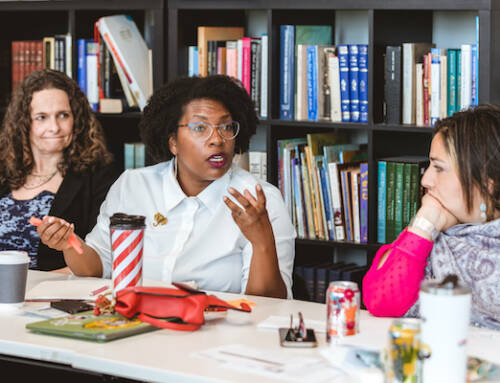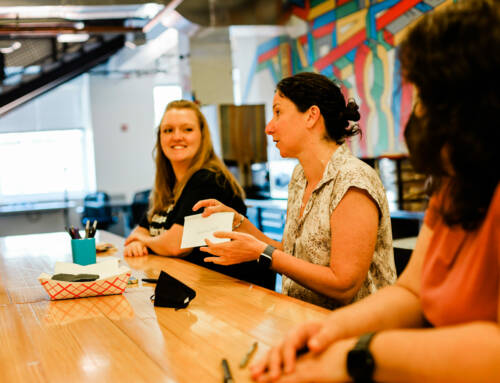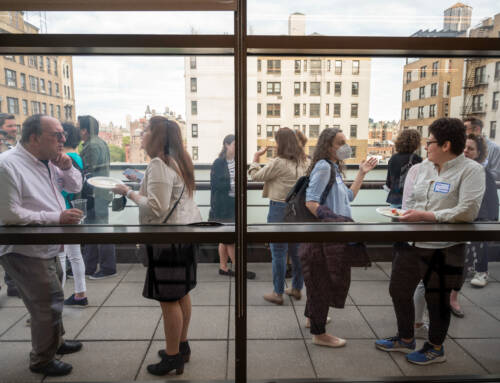November 21, 2016| Medium

OneTable’s Aliza Kline at a 2012 Community Catalyst Workshop with UpStart and the Jewish Education Project.
Aliza Kline, CEO of OneTable, first learned about the transformational power of design thinking when working with UpStart’s team four years ago. Now she’s applying what she learned to launching and growing OneTable, an online and in-person hub for young people to enjoy and share Shabbat. We asked Aliza what she’s learned along the way.
Why did you start OneTable? What need are you addressing?
Millennials are the most stressed-out and lonely generation in America. Simply put, they need Shabbat — for the connections, the comfort of ritual, and the stress relief. According to the Pew Research Center, millennials “have fewer attachments to traditional religious institutions, but they connect to personalized networks of friends, colleagues and affinity groups through social and digital media.” OneTable is designed to empower Jewish young adults to build micro-communities while creating their own authentic Friday night dinners, ultimately forming a lifelong Shabbat practice.
You’ve decided to take on the role of “Jewish social entrepreneur.” Why were you personally inspired to launch a Shabbat-focused venture?
Shabbat dinner is the moment each week when I can check-in with my priorities. Work stops, the focus changes to the people in my life I love the most, and our purpose is to look each other in the eye, share our gratitude for each other and enjoy ourselves. I am a ritualist — my whole career has been about making ritual more easily accessible so that others can have the benefit of capturing a fleeting, sacred moment with intention.
You’ve said that you used the design thinking methodology you learned with UpStart to design OneTable. Tell us more.
In 2012, I worked closely with UpStart Founder Toby Rubin and UpStart’s IDEO-trained design thinking coach, Ela Ben-Ur. With their guidance, I fell in love with design thinking. It forces me to go slow to go fast. When I was hired to lead OneTable, I identified early on that I was not at the same life-stage as our target population. Relying on my intuition and assumptions would not help us create an effective solution. If OneTable were to successfully support millennials in creating personally authentic Shabbat experiences, we’d have to start by understanding their needs and values.
The first step of design thinking is understanding and empathizing with your users. How did you do that in OneTable’s early stages?
Early on, we hired Jamie Betesh, a market research consultant. She coached a team of observers to learn from as many young adults hosting Friday night dinners, supper clubs, and traditional Shabbat gatherings, as well as from young adults who were just hanging out on Fridays doing something else. Through that process, we identified two categories of people: 1) “Seekers” — people in their early 20s who were looking to meet new people and try new things on Fridays and 2) “Nesters” — people in their later 20s and 30s who were more likely to own a table, and were inclined toward a more quiet intimate Friday night dinner party.
We learned they were going online to make plans to meet offline, and explored the growing network of social dining platforms and meetup websites. And we learned that while they loved the idea of real-life dinners, they were stymied by a range of barriers including basic hospitality skills and comfort.
Can you give concrete examples of how you eliminated those barriers?
When we learned that cooking and dinner planning were a challenge, we initiated three offerings:
1) Nourishment credit — access to $15 per person in credit redeemed online for groceries or prepared foods through on-demand sites;
2) Shabbat hotline — a hotline where a live person answers any and all questions about which Nourishment credit to select and how to plan the logistics of a dinner party;
3) Shabbat coaching — 1×1 meeting with a trained, open-minded and experienced Jewish educator to support a host as s/he prepared for an intentional Shabbat dinner.
UpStart believes strongly that failure is simply another opportunity to learn. Are there any initial failures that were particularly informative?
Ha! So many to choose from. In the beginning, we tested several recruitment strategies including carefully selecting brand ambassadors who could fill up a happy hour with other young, good-looking Jews. However, none (really, none) of them were interested in becoming Shabbat dinner hosts — they were just looking for a happy hour. Now, when we launch in a new city we start with people who are already inclined to host, like food bloggers, and invite them to dinner to learn about OneTable.
When you first learned with UpStart, you were designing collaborations with the Jewish Education Project. How have you applied what you’ve learned about collaboration to OneTable?
We have been building local and national partnerships since our inception in 2014. When we launch in a new city, partners that also engage young Jewish adults allow us to more efficiently reach our target population and help our partners leverage their own network. For example, Repair the World can inspire more dinner conversations about social justice by partnering with OneTable and building out the #TurnTheTables campaign.
You first worked with UpStart as an “intrapreneur.” We’re thinking a lot about how entrepreneurs and intrapreneurs are increasingly working together. What do you think they can learn from each other?
Both are challenging and require vision, chutzpah and persistence, although, intrapreneurship also requires a level of patience that I find challenging to cultivate. Regardless, both can practice curiosity and can create hacks to help when they veer off the human-centered tracks. One I suggest is hitting a buzzer every time you utter (or hear one of your colleagues or funders utter) the words, “they should” in reference to the target population. Like, “they should enjoy Shabbat dinner,” “they should be grateful,” “they should feel obligated to donate.” We need to banish “should”- as soon as it’s named, that’s the reminder that we are no longer focusing on the needs and values of the people we are serving.
Our purpose is to enable entrepreneurs to bring bold Jewish ideas to light. We help them reach Up to people in new ways that are meaningful, more inclusive, and create a brighter future for our Jewish community and the world we share.





